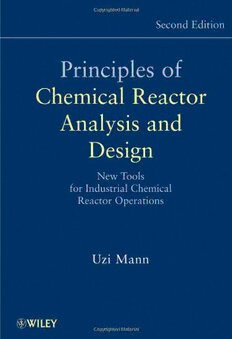
Principles of Chemical Reactor Analysis and Design: New Tools for Industrial Chemical Reactor Operations PDF
494 Pages·2009·3.147 MB·English
Most books are stored in the elastic cloud where traffic is expensive. For this reason, we have a limit on daily download.
Preview Principles of Chemical Reactor Analysis and Design: New Tools for Industrial Chemical Reactor Operations
Description:
Principles of Chemical Reactor Analysis and Design presents a new fundamental approach and methodology that overcome the deficiencies of the current method of teaching chemical reactor design. It provides engineering students and practitioners with the tools needed to handle contemporary industrial reactor operations, new design capabilities, and the framework for new economic-based optimization.Features include:- Reactor operations are described by dimensionless variables (in most cases, between -1 and 1) and dimensionless design equations.- The design is formulated in terms of the smallest number of design equations and the least number of terms in each equation; hence, the most robust formulation.Solutions of the design equations provide dimensionless operating curves (a new concept in CRE). These curves provide complete information on the progress of the chemical reactions, the formation (or depletion) of all individual species, and changes in temperature. Reactor sizing represents a "point" on these curves (similar to the way a "point" on dimensionless friction factor versus Reynolds number charts is used).- Discusses new design capabilities for reactor configurations.
See more
The list of books you might like
Most books are stored in the elastic cloud where traffic is expensive. For this reason, we have a limit on daily download.
